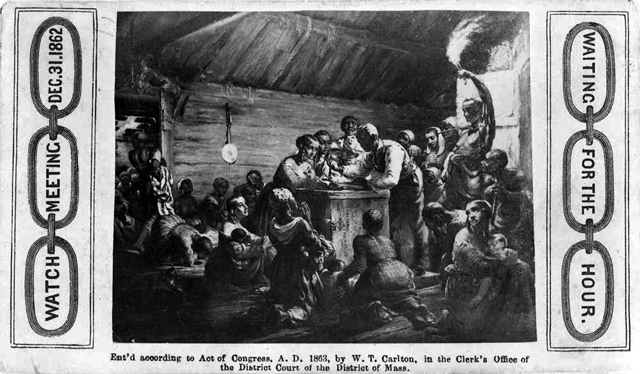
Watchnight service on the eve of the Emancipation Proclamation
By William Lawbaugh
On Saturday at the Community of Celebration’s Holy Spirit Chapel in Aliquippa, Pennsylvania, we will celebrate Watchnight.
Watchnight, developed in the early 18th century by Moravians and popularized by the Anglican Wesley brothers to counter the practices of coal miners in rural England, is a Christian alternative to a New Year’s Eve of drunkenness and debauchery. It is a marvelous way to clean up our messes, mend our broken relationships with God and neighbor, confess our shortcomings, do penance, and amend our lives with sure and certain New Year’s resolutions.
Moravians, with whom we share full communion, are known for their music and liturgy. We can trace their three-hour New Year’s Eve “watch” back to 1733, in what is now known as the Czech Republic.
John Wesley, whose heart was warmed by the Moravians, methodically adapted the watch service in 1740. His brother, Charles, composed the service’s opening hymn, “Come, Let Us Use the Grace Divine,” in 1762.
|
The Wesley Covenant Prayer I am no longer my own, but yours. |
The Wesleys called these Covenant Renewal Services, inspired by Charles’s hymn and by John’s “Covenant Prayer.” Ralph Vaughan Williams renewed the music for the hymn in 1906. Watchnight appears in the United Methodist Church’s Book of Worship and its hymnal. Members of the Church of Scotland celebrate the service each Christmas.
Watchnight Services on New Year’s Eve have a lot to offer the Episcopal Church, not only to dispel the ugly notions of alcohol abuse but also to reform ourselves. An abbreviated liturgy for New Year’s Eve appears in The Book of Occasional Services, based on the Holy Name of Jesus, but it pales in comparison to Moravian or Methodist Watchnight services.
Although it is too much to ask our people to attend a three-hour service of worship, praise, prayer, confession, repentance, restoration, hymns, Holy Scripture, testimony, and plenty of New Year’s resolutions, we can take home ten essentials of a Watchnight service and practice them privately:
- Reflection on the past year. Charles Wesley’s opening hymn stresses the importance of Covenant, and the Episcopal Church’s Baptismal Covenant offers ample opportunities to reflect.
- Confession of sin. After a thorough examination of conscience, we turn to a confession such as that found in Enriching Our Worship: “We repent of the evil we have done and the evil done on our behalf.” We also thank God for the grace to survive the past year of shortcomings and missing the mark.
- Repentance and absolution. We ask God to absolve all our sins and seek ways to show true repentance.
- Restitution. Watchnight is when we resolve to return all borrowed or stolen goods to our neighbor. It is also a time to resolve to pay all outstanding debts and loans.
- Reconciliation. We begin to repair all damaged or broken relationships, especially with God but also with family and neighbor. We resolve to keep trying.
- Hymns of praise. Augustine of Hippo once said that we pray twice as we sing hymns.
- Scripture reading. Curl up with the Word of God and pray the Scriptures, starting with Psalm 51 and Matthew 25.
- Meditation and contemplation. Modern forms may include centering prayer and mindfulness.
- Practical New Year’s resolutions. The American Medical Association reports that about half of us make such resolutions, most of them dealing with health, and we fail if we do not set milestones or track our progress.
- Aspirations to a more disciplined life. Remember the folk wisdom that the definition of insanity is to do the same thing repeatedly but expect different results.
The Rev. William M. Lawbaugh is a resident companion (oblate) of the Community of Celebration in Aliquippa, Pennsylvania. This article is adapted from a sermon he will preach on New Year’s Eve.









